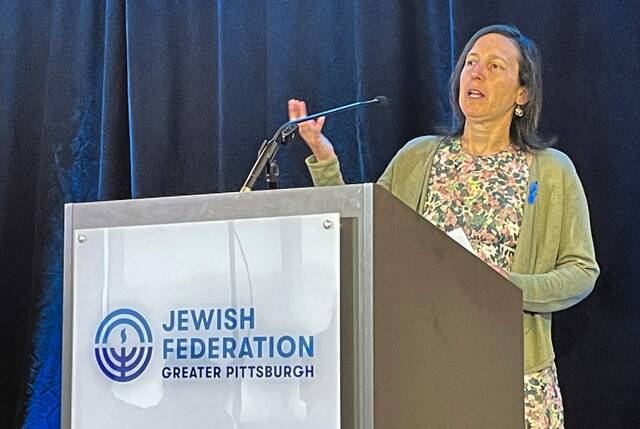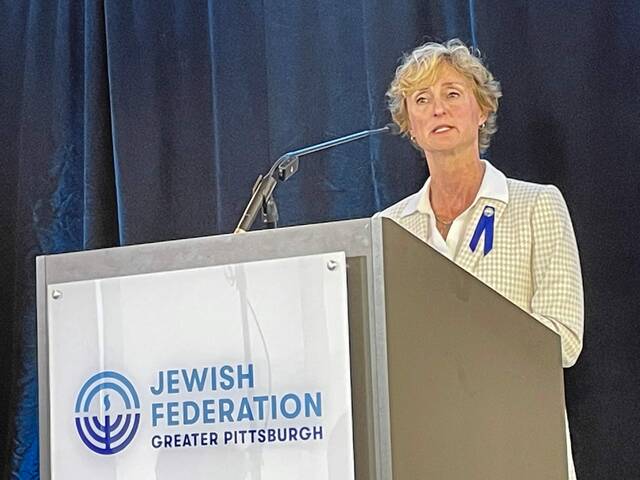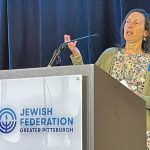If they couldn’t erase the deeds, some chose to erase the alleged perpetrator.
“For the past 4 1⁄2 years there’s been an effort to not speak the name of the defendant, to not look at photos of the defendant,” Jordan Golin, president and CEO of Jewish Family and Community Services, said Friday about the man charged with killing 11 worshipers at a Squirrel Hill synagogue in 2018. “Many people weren’t aware of what he actually looked like.”
But with jury selection underway in the case, considered the worst antisemitic attack in the nation’s history, those family members of the victims who want to bear witness have had little choice but to come face to face for the first time with Robert Bowers.
Some have expressed “reservations and trepidation” about the experience, said Golin, one of several speakers at the South Oakland headquarters of the Jewish Federation of Greater Pittsburgh who discussed preparations among the local Jewish community for trial.
In the strangely intimate process of jury selection, conducted inside the federal courthouse in Downtown Pittsburgh, the 50-year-old accused mass murderer sits in the open at a conference table as lawyers and the presiding judge pepper prospective jurors with questions. How might they feel, citizens are asked, about voting to put Bowers to death if he’s found guilty?
All the while, Bowers listens. And so do the victims’ loved ones.
“The way the jury selection process was set up, people were looking at his face, not the back of his head,” Golin said.
Whether they saw the face of evil, the face of hate, the face of antisemitism or just a face, the experience was jarring, according to Golin.
Knowing that family members of the victims would need strength and succor as the legal odyssey enters its final phases – a lengthy trial, and, possibly, an intense battle over punishment — Golin and many others within and outside Pittsburgh’s Jewish community have drawn together to provide what help they can.
Golin discussed how therapists had been dispatched to the courthouse to soothe psyches.
Shawn Brokos, the federation’s director of community security, spoke of hardening potential targets, preparing for contingencies if antisemitic protesters show up in Pittsburgh, and of monitoring hate speech spewing from the internet’s darkest corners.
“We’re acutely aware the defendant has a range of supporters who share his white supremacy ideology,” Brokos said. “We have seen an uptick in hate speech, hate rhetoric, directed towards the Jewish community.”
As a wounded Bowers crawled toward police to surrender in the aftermath of the shooting, authorities said that he repeatedly declared, “All these Jews need to die.”
So far, Brokos said, there have been no direct threats – only “hateful vitriol” that would “turn anybody’s stomach.”
But in learning the lessons from 2018, forewarned is forearmed.
“We were not prepared for that,” Brokos said. “We did not see that coming.”
Brokos, who grew up Protestant in Philadelphia with many Jewish family friends, uses “we” and “us’ when she talks about enhancing security in Pittsburgh’s Jewish community.
“It’s a community where I feel very much at home,” Brokos said.
Brokos, 53, was the FBI’s crisis management coordinator in Pittsburgh when the shooting began at Tree of Life synagogue, killing members of the three congregations in its building – Tree of Life-Or L’Simcha, Dor Hadash and New Light.
She helped to process the crime scene and was on the ground when the Chevra Kadisha – an Orthodox Jewish burial society – arrived at the synagogue to gather the remains for burial of victims Bernice Simon, 84, and her husband, Sylvan Simon, 86; brothers David Rosenthal, 54, and Cecil Rosenthal, 59; Dan Stein, 71; Irving Younger, 69; Dr. Jerry Rabinowitz, 66; Joyce Fienberg, 75; Melvin Wax, 87; Richard Gottfried, 65; and Rose Mallinger, 97.
In December 2019, Brokos retired from the FBI after a 24-year career. A month later, she had taken over as security director of the federation from another former FBI agent.
As supervisor of the Pittsburgh field office’s public corruption and civil rights squad, which includes the hate crimes section, “I wanted to see the investigation all the way through to trial,” Brokos said.
She never dreamed that it would take so long.
Also walking that long path is Michele Rosenthal, a sister of victims David and Cecil Rosenthal.
She has spoken publicly about supporting the death penalty for Bowers. She joined other members of seven of the nine families of the victims in writing a letter in July 2021 to Attorney General Merrick Garland supporting the punishment in this case.
Taking the podium Friday, sporting a blue ribbon on the lapel of her olive cardigan, Rosenthal noted that the “horrors and trauma” of Oct. 27, 2018 not only won’t ever recede, they’ll be magnified in the coming weeks as Bowers’ trial begins on 63 charges.
“But what I prefer to focus on,” she said, “is the solidarity and kindness that I have felt, not only from my friends, but even from complete strangers.”
Networking with people in the local food industry, Rosenthal found volunteers willing and eager to help. She engineered meal donations to family members during jury selection — no easy task considering strict security measures in place for jury selection.
Donors’ kindness made her think of her brothers, she said, how they loved it when their parents would take them to dinner at Eat’n Park or when they could help cater a luncheon at Tree of Life.
“Being able to share lunch together and not worry about where to go or how much time we have away from the courtroom is so important and gives comfort to all of us,” Rosenthal said. “It is not just the food, but more importantly, the love and care that has gone into providing it and getting it to us.”











